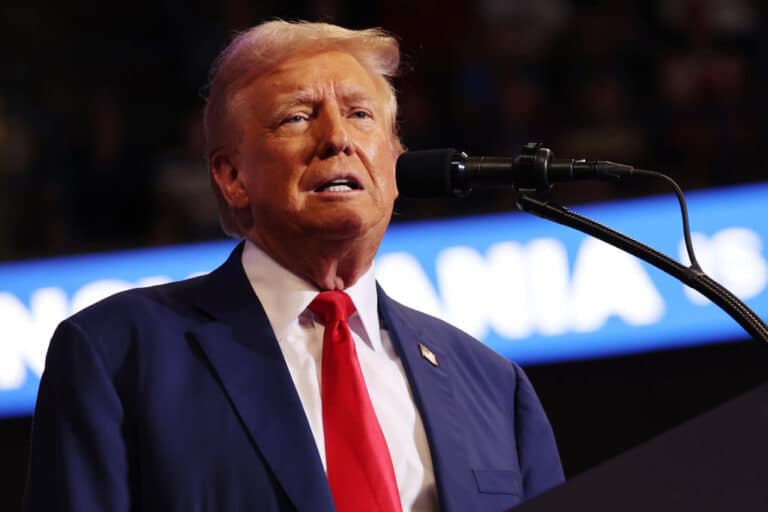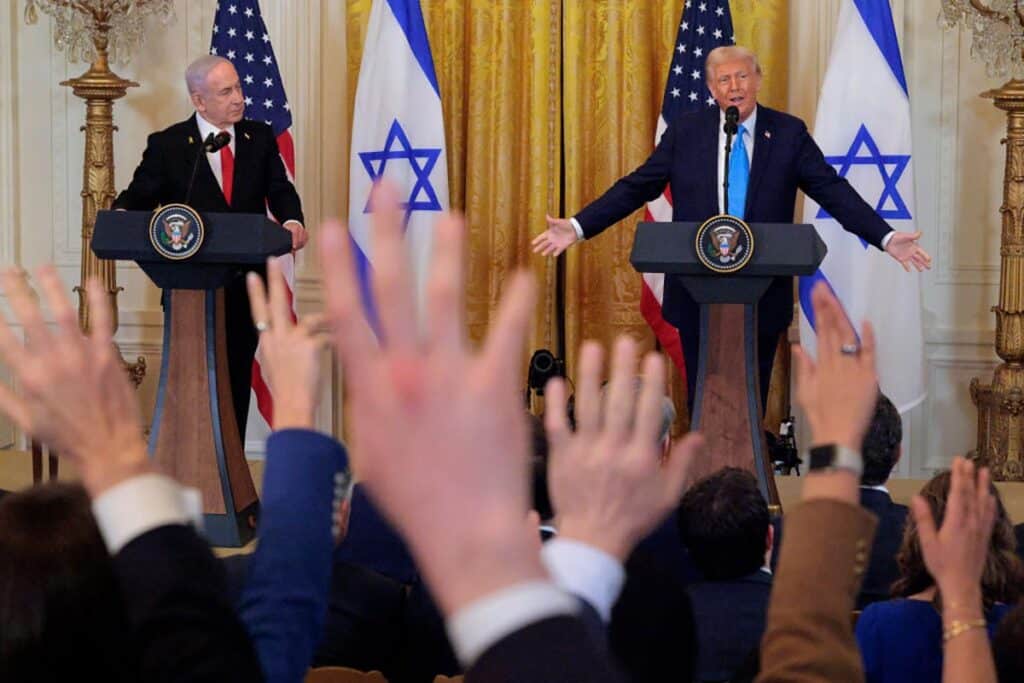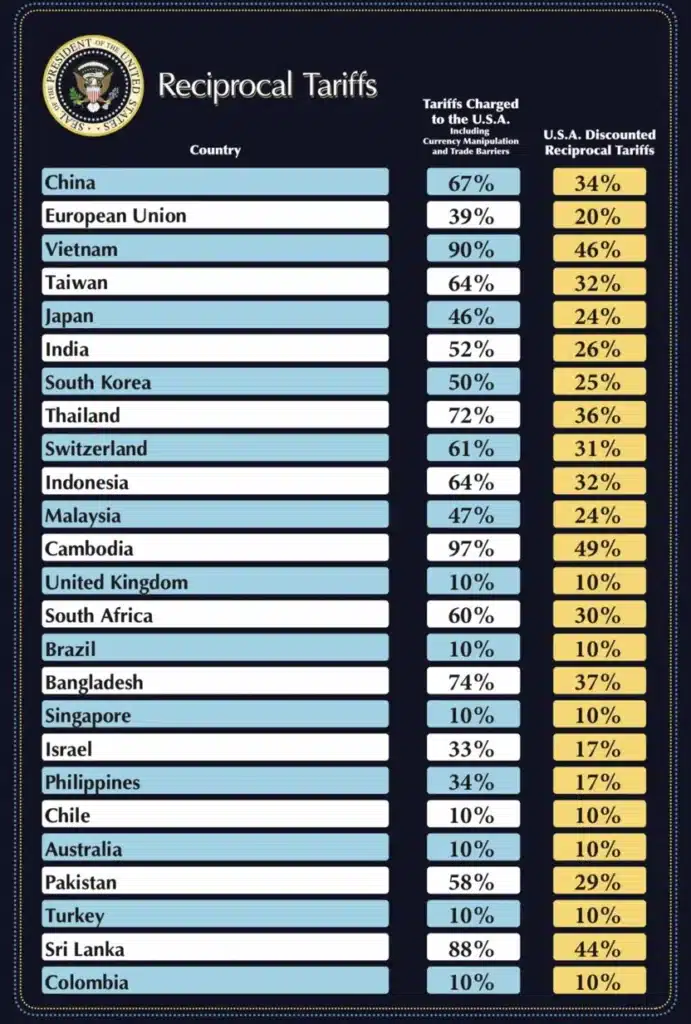
Just one day after Israeli Prime Minister Benjamin Netanyahu announced the elimination of all tariffs on goods imported from the United States, U.S. President Donald Trump retaliated with a 17% tariff on Israeli imports.
Trump unveiled the move during his self-declared “liberation day,” a sweeping economic policy shift that imposed tariffs on every foreign country. The baseline was set at 10%, with higher rates levied against nations that previously imposed tariffs on U.S. goods, halving the preexisting rate.
Israel, one of America’s closest allies, received a notably steep 17% tariff — higher than those imposed on countries such as Afghanistan and even Iran. The decision surprised many observers, particularly given Israel’s long-standing diplomatic and economic partnership with the U.S.

What were Israel’s tariffs on the U.S.?
The Trump administration alleged that Israel imposed a 33% tariff on American goods. In reality, that claim is inaccurate.
Since the 1985 Israel–United States Free Trade Agreement, 98% of U.S. exports to Israel have entered the country duty-free. The remaining 2% — primarily agricultural products — accounted for only $11.3 million annually (about 42 million shekels), according to Israel’s Finance Ministry.
Today we cancelled all of the customs duties levied on products from the US, Israel's largest trading partner.
— Benjamin Netanyahu – בנימין נתניהו (@netanyahu) April 1, 2025
Cancelling the customs duties on American goods is an additional step in the policy that my governments have led for a decade in opening up the market to competition,…
“Today we canceled all of the customs duties levied on products from the U.S., Israel’s largest trading partner,” Netanyahu wrote on X. “Canceling the customs duties on American goods is an additional step in the policy that my governments have led for a decade in opening up the market to competition.”
The move was widely viewed as a goodwill gesture aimed at reinforcing economic ties — a gesture that now appears to have gone unreciprocated. X owner Elon Musk, a vocal Trump ally, reacted with a minimalist post: two emojis — an American flag and an Israeli flag.
🇺🇸🇮🇱
— Elon Musk (@elonmusk) April 1, 2025
Why is Israel being targeted for tariffs?
The Trump administration framed the new tariffs as part of a broader effort to reduce trade deficits and correct the “lack of reciprocity in our bilateral trade relationships.”
“These tariffs will remain in effect until such a time as President Trump determines that the threat posed by the trade deficit and underlying nonreciprocal treatment is satisfied, resolved or mitigated,” the White House said.
Another White House official had a different hypothesis for the focus on Israel ahead of the announcement: “Israel steals a lot of intellectual property from, for example, the pharmaceutical manufacturers in this country.” However, no evidence was provided to substantiate this allegation.
In 2024, the U.S. imported $22.2 billion in goods from Israel while exporting $14.8 billion — a trade imbalance of $8.2 billion. While significant, the broader context tells a different story: Roughly one in every ten products imported by Israel comes from the U.S.
About 14.1% of Israel’s total exports are destined for the American market; conversely, just 0.7% of U.S. exports go to Israel.

How will this affect kosher foods and Israeli imports?
Tariffs are typically passed on to consumers through higher prices, as businesses adjust to maintain profit margins. If applied across the board, the 17% tariff on 2024’s $22.2 billion worth of Israeli goods would cost American consumers an estimated additional $3.77 billion.
Israel primarily imports precious stones and metals (mainly diamonds); pharmaceuticals; electrical and electronic equipment; and optical, photographic, technical, and medical apparatus to the U.S..
Israel is estimated to have imported $5.43 billion to the U.S. in diamonds in 2023, making up more than 10% of the American diamond market.
Kosher-certified foods, many of which are imported from Israel, are expected to rise in price. Judaica — including prayer items such as Torah scrolls, mezuzahs, and tefillin — may also see price hikes, given that many are crafted in Israel by specialized artisans and soferim or highly-specific factories.
While much of the kosher poultry consumed in the U.S. is domestically raised, a significant portion of kosher beef is imported from countries like Uruguay, Argentina, and Brazil — all of which were hit with 10% tariffs under Trump’s new trade policy. Since American beef — both kosher and non-kosher — is generally more expensive due to higher production and labor costs, these tariffs are unlikely to make U.S. meat the cheaper alternative. In other words, kosher consumers may face higher prices across the board, regardless of whether the meat is imported or domestic.
Trump’s tariffs will officially begin on April 5 at midnight. ET with the across-the-board 10% tariff. Per the White House, the additional 7% tariff on Israel will be tacked on April 9 at midnight.
What has been the response?
Reactions to the tariffs have been swift and largely negative, both from Israeli officials and American voices in the Jewish and economic communities.
President and CEO of Democratic Majority for Israel Mark Mellman said that Trump “made a grave error in slapping a higher tariff on Israel than on Turkey and even Iran, especially given the fact that Israel eliminated all tariffs on American goods.”
“The president’s action helps the BDS movement achieve one of its key goals — damaging the U.S.-Israeli economic relationship,” he added. “This action undermines the longstanding and robust economic relationship between the United States and Israel, a relationship that has been built on trust, mutual benefit, and a commitment to free and fair trade.”
An Israeli official expressed their concern about the tariffs and the impact they’ll have on Israel, as the government reportedly expected Trump to spare the Jewish State from the tariff.
“We are in shock. We were sure that the decision to completely cancel tariffs on imports from the U.S. would prevent this move. But it didn’t happen,” the official told the Jerusalem Post. “It’s going to be hard, but we will work to change the decision. The decision is unjustified.”
Israel eliminated all its tariffs on US imports, an excellent and smart move.
— Dominic Pino (@DominicJPino) April 2, 2025
Trump still wants to put 17% tariffs on Israeli goods.
Everyone on here shouting "reciprocity!" for the past few weeks is a confirmed idiot.
National Review Institute fellow Dominic Pino ripped the U.S. tariffs over what he sees as faulty financial logic.
“Israel eliminated all its tariffs on US imports, an excellent and smart move. Trump still wants to put 17% tariffs on Israeli goods,” Pino wrote on X. “Everyone on here shouting ‘reciprocity!’ for the past few weeks is a confirmed idiot.”
Dr. Ron Tomer, president of the Manufacturers Association of Israel, warned of broader economic fallout.
“The Israeli industry is deeply worried by President Trump’s decision to impose new tariffs on Israel,” he said. “We’re trying to understand the rationale behind this move. The claim that Israel imposes 33% tariffs on American goods is unclear, and the 17% response seems unjustified.”
Tomer warned that this may lead to many Israeli workers losing their jobs: “This decision threatens Israel’s economic stability, could deter foreign investment and weaken the competitiveness of Israeli firms in the U.S.”
Originally Published Apr 3, 2025 12:31AM EDT

